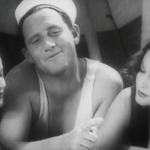 |
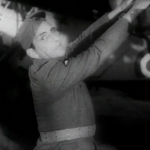 |
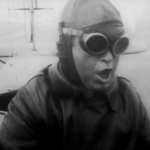 |
| Wilkie Spencer Tracy |
Hogan William Boyd |
Mitchell George Cooper |
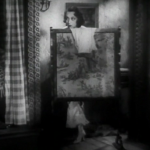 |
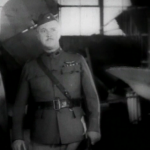 |
 |
| Mary Ann Dvorak |
The Colonel Billy Bevan |
Fifi Yola D’Avril |
| Released by United Artists | Directed By A. Edward Sutherland |
||
Proof That It’s Pre-Code
- The best part of being a lifeguard is the women. Sometime you may even get two!
- Someone shouts at a pair of boxers, “Maybe you’d two would like to be alone!” Wilkie adds after a punch, “Why don’t you two kiss and make up?”
- Wilkie (Tracy) and Mitchell (Cooper) have to clean up after the horses, and many of their stories about it involve dancing around using the word ‘shit’.
- Mitchell: “I’d be afraid to wear perfume around a lot of sailors!”
- Gams from a local French girl.
- The way that Wilkie describes ‘the loop’ to that girl would probably turn some heads. (It involves grabbing the throttle, among other tidbits)
- There’s an uncooperative window shade that keeps giving soldiers a glimpse of a scantily clad Mary (Dvorak).
- “Give the lady a room and a bath.” “Well, I can give her a room–” “I know, I know, she has to take the bath by herself.”
- The movie ends with Spencer Tracy murdering a bunch of American flyers before one final wisecrack, but, hey, we’ll get into that below.
Sky Devils: Tailspin
The First World War was still readily in the minds of filmmakers as talking pictures arrived. On the heels of Wings‘ success in 1929, talkies ushered in a crop of movies all along similar ideological and dramatic lines, including 1930’s Best Picture Winner, All Quiet on the Western Front. And while there were many serious war movies that pointed out the futility of trench warfare and extended combat like All Quiet, there were plenty of other angles to be mined: Ever in My Heart looked at racism towards German-Americans, Mata Hari and a host of others delighted in spy games, Hell’s Angels hammered the action aspect, while even comedians got in on the act. Buster Keaton, in the midst of his MGM hell, produced Doughboys while the Marx Brothers had only a few years to go before their spoof, Duck Soup, would become a benchmark for screen comedy by twisting the war into an unrecognizable form of insanity.
And while the dramas, spy thrillers, and satires remain with us today, there are a couple of other genres that were unique to the late-20s and early-3os that also got the treatment. One that particularly hasn’t stood the test of time is the “wiseguy” movie, starring a smart alec who knows more than everyone and, in the course of the film, is proven completely right. Today these movies are seen for what they are– kind of annoying, really– but oftentimes pictures about common guys with a wise mouth could find some measure of success, especially when led by Jimmy Cagney.
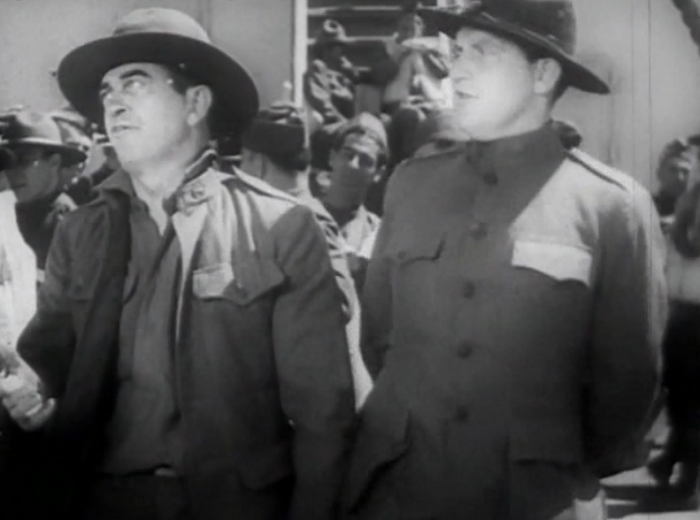
This goofy eyed world
The silent film What Price Glory? (1926) was a successful variation of this, taking a pair of hardassed marines named Quitt and Flagg and letting them bounce off each other as they ran amuck across the armed forces and the world. The movie was a success and spawned a pair of sequels, including the beautifully named The Cock-Eyed World (1929), Women of All Nations (1931), and Hot Pepper (1933). It’s unsurprising that others would try and cash in on this, least of all producer Howard Hughes. His Hell’s Angels had just made a pile of dough, so a follow-up may not only include more spectacular air footage, but also a wiseguy know-it-all ready to strut his way across the Eastern Front.
Spencer Tracy was stuck in this kind of role in the early 1930s, the jerk who steamrolled over a couple of dumb sidekicks and single handedly saved the day and got the girl. You may have noticed that this kind of wiseacre is more of a common of a 20s/30s trope than anything you’ll actually get during the war. This sort of application of a 1930s stereotype into a historical setting is pretty much the definition of revisionism. Here is World War I by way of the modern man. See how flippant he is? See how unpatriotic? See how this big old war ain’t nothing to him?
The sentiment here is that Tracy’s Wilkie is a man above and beyond the stupidity of the war. A decade on and World War I is a cartoon. No one can take it seriously– not why we were there or what we were doing. Bravery is accidental, and every soldier’s story of heroism is just handed down from the other poor dumb soldiers.
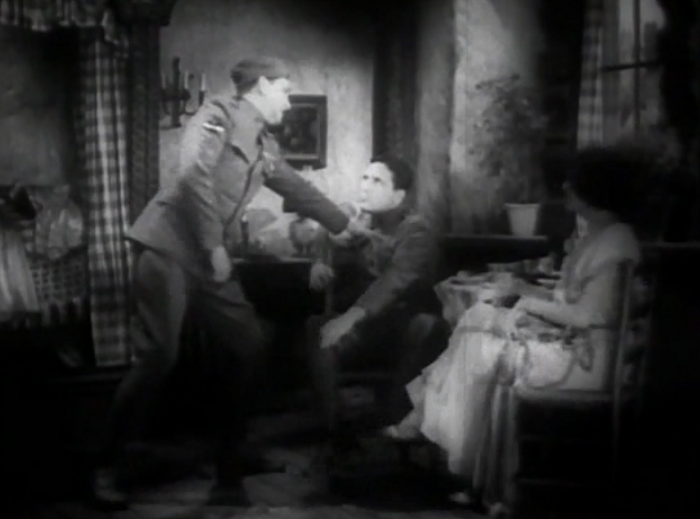
The real purpose of military service? Finding babes.
It’s inherently, deeply cynical, wrapped up in a comedy so that its many winks and nods don’t push the audience too far. But for a movie that doesn’t take the war seriously, it sure wants to capitalize on it– the final third consists of mostly aerial acrobatics (stock footage borrowed from Hell’s Angels, naturally), a long series of daring stunts that sink in the tensionless screenplay which inexplicably keeps Wilkie away from airplanes in spite of the title and instead running around on the ground from one set of contrived circumstances to another.
The overall plot of Sky Devils could be called haphazard, though that may be underselling it. The jokes flail– one bit that sees everyone having a half serious conversation on an exaggeratedly rocky boat ride is notably dismal in execution– and are vulgar in completely uninteresting ways. Wilkie and Mitchell aim to stay out of the army and don’t, eventually working their way from shoveling horse manure to becoming fliers, both by flattering the officers and getting into fights with their brusque leader, Sergeant Hogan.
The movie becomes pretty interminable as it draws near the 60 minute mark, something that only magnifies when you remember the movie is 90 minutes long. Much of the comedic dialogue is simply Tracy delivering a put down or insult, and his dumb guy friend either meekly acquiescing or a terse, “Oh yeah?!” in response. Because of this, and while I’m pretty certain this dialogue never occurred, much of the movie’s back and forth sure feels like it follows this pattern:
“Oh yeah?!”
“Yeah!”
“Oh yeah?!”
“Yeah!”
Ad infinitum.
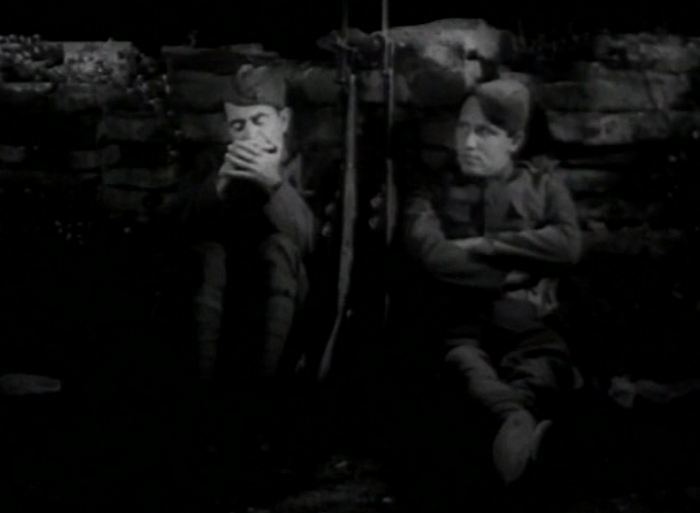
“Oh yeah?!” “YEAH!”
Sky Devils‘ highlight comes from an energetic Ann Dvorak, the only piece of the movie that offers any thrills– an almost sad fact in a movie that involves so many aircraft exploding. But the truth is that Dvorak, in her only second credited role after years working as cinematic chorus girls, really gets to let loose and have fun. Her Mary follows no discernible plot. She’s an entertainer on the front, but wants to see ‘the real war from the trenches!’ for some unexplained reason and then just ends up tagging along behind Wilkie as he tries to get into her pants and away from the bombs. Luckily, Ann undertakes all of the ludicrous goings-ons with a big smile and an unmistakeable gleam in her eye.
But, as vital as she is, the rest of the movie is trapped in a miasma of resentment and indifference. The American officers are buffoons, the French girls are flirts, and the Germans are practically non-existent. Even though the movie is most certainly in a cartoon world, it’s still unsettling to see Wilkie, Hogan, and Mitchell killing so many people with such complete indifference. But it fits in with what Sky Devils and many post-World War I films are saying: it wasn’t our fight and we were better than it. Next time let’s let Europe handle its own mess.
If you want my sincere advice on tracking down and watching Sky Devils, it’s this: don’t. It’s a really lousy comedy that’s a bear to sit through. But for a good example of 30s machismo being applied in retrospect to one of the world’s deadliest conflicts… well, there are still better movies to track down.
Gallery
Hover over for controls.
Trivia & Links
- This post is one of many distinguished entries into the World War One in Classic Film Blogathon, hosted by Movies Silently and Silent-ology. You can read lots of other reviews, including takes on pre-Codes like I Was a Spy (1933) and Wooden Crosses (1932). Click on the banner to see all of the entries!
- For as completely schizophrenic as this film may be, the AFI notes seem to have a bit of an explanation– at one point, Sky Devils was two films. Here’s there short report:
According to various news items and information in the Jack Mintz Collection at the AFI Library, two separate films were shot, the result of which was Sky Devils. The first production, never released, was directed by Edward Sedgwick in May-June 1931. Sedgwick, however, resigned. Filming resumed in September 1931 with a rewritten story, under Edward Sutherland’s direction, and with Charles Stallings as production manager. The Sedgwick-directed story ended with a scene in an Arabian desert. The extent to which the plot was altered elsewhere has not been determined. According to a Film Daily news item, Lola Lane and Sidney Toler, who appeared in the Sedgwick-directed production, were committed to other films by August 1931, and Lane was replaced with Ann Dvorak, while Toler was replaced by William Boyd. It is doubtful that any footage from the Sedgwick-directed production appears in the released film.
- The ever brave Christina Rice, she behind the biography Ann Dvorak: Hollywood’s Forgotten Rebel, admits that she’s seen this movie twice, the poor woman. (Which I can imagine is the only thing worse than making this movie twice!) She has two entries on it, one being a review that can be summed in the word “disdainful” and the other is showing off a lobby card from the film she managed to acquire.
- Dr. Macro has a couple of cool looking posters and a couple of stills. This one makes an appearance on both Christina’s site and Doc Macro’s… I wonder why it remains so popular…
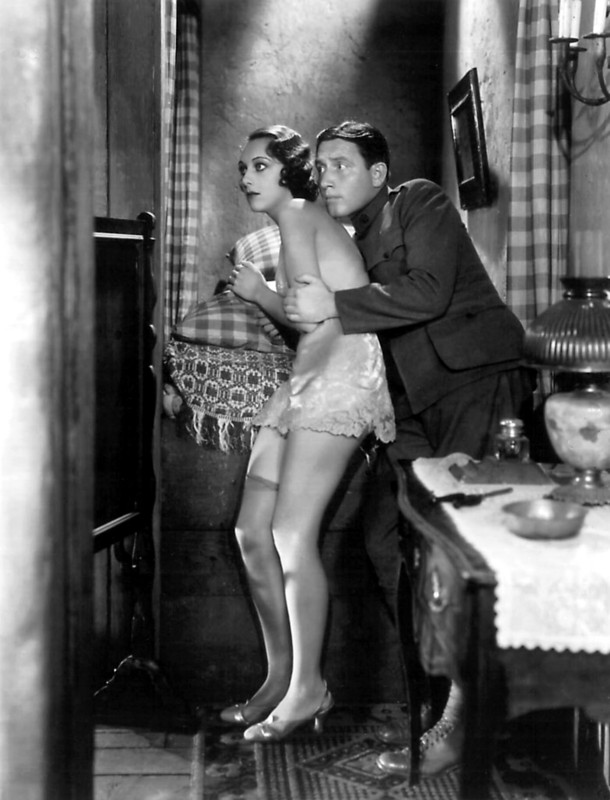
Awards, Accolades & Availability
- This film appeared in the List of Pre-Code Films.
- This film is an obscure one. I wish you luck in finding it!
Comment below or join our email subscription list on the sidebar! |
||
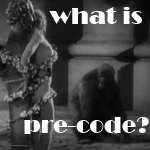 |
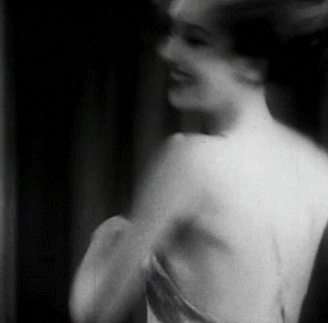 |
 |
 |
 |
|


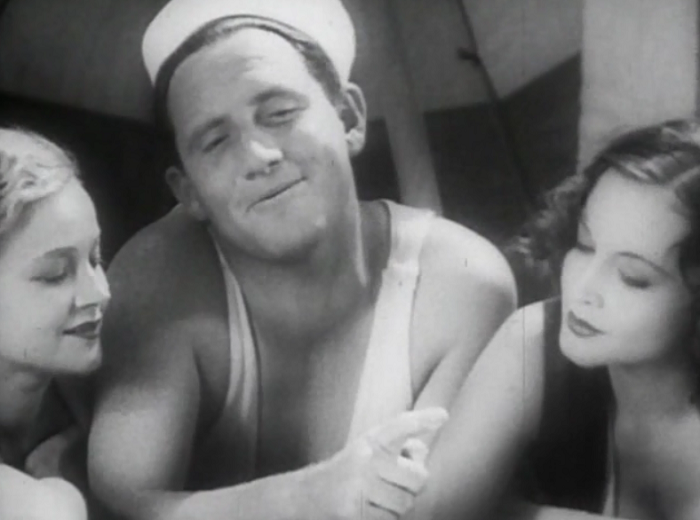

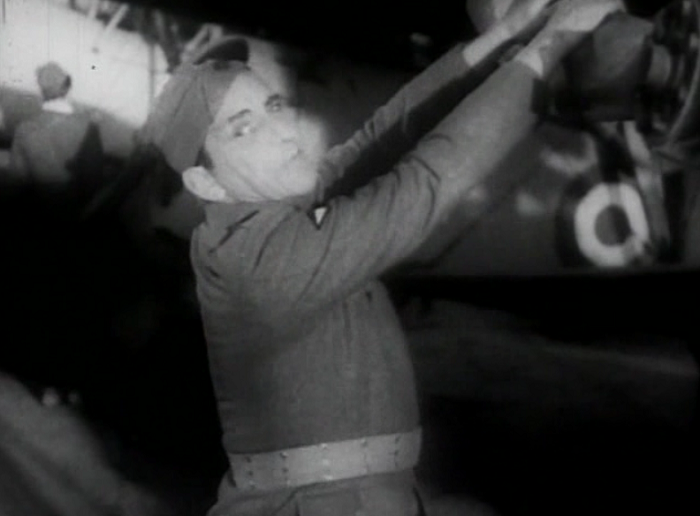
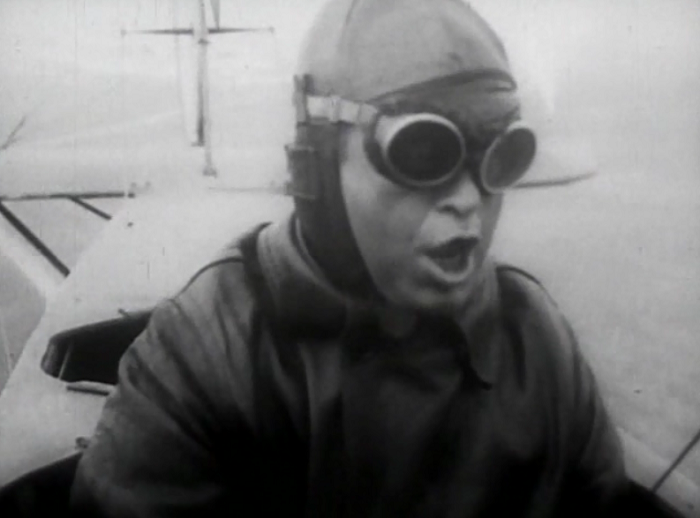
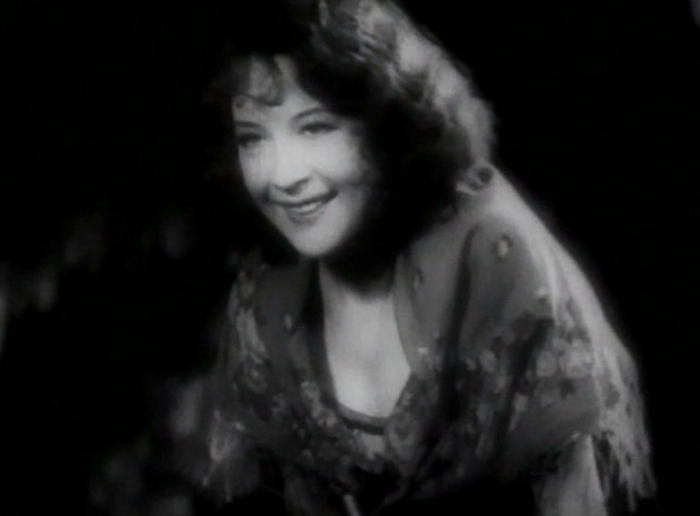
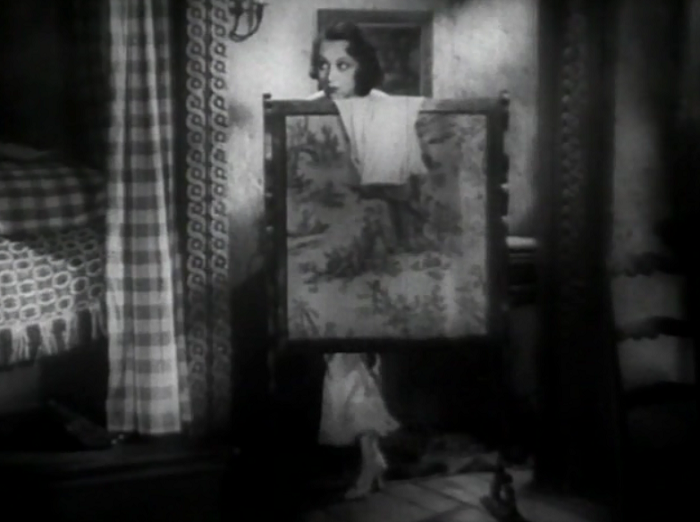
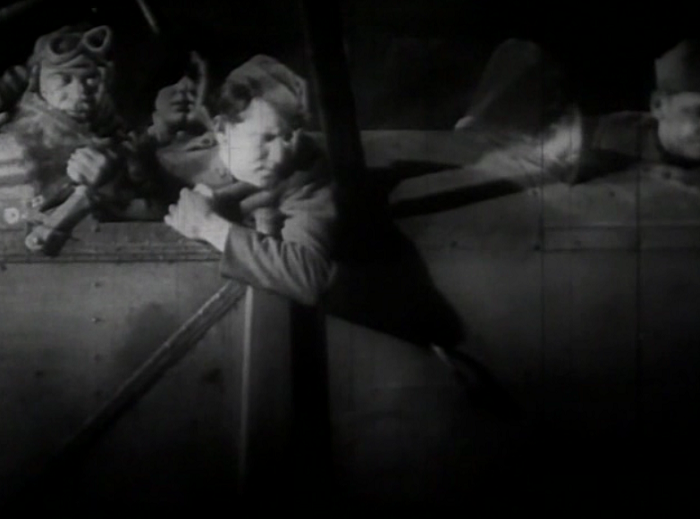
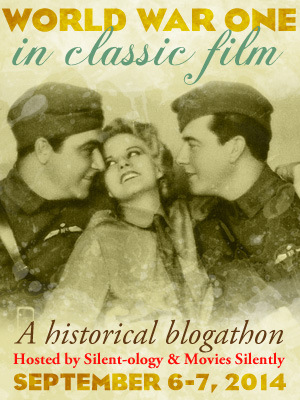


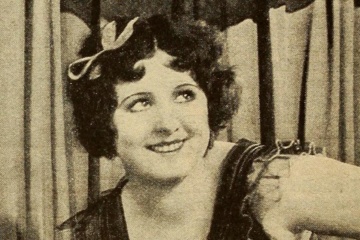
15 Comments
Patricia Nolan-Hall (@CaftanWoman) · September 7, 2014 at 1:50 am
Your advice is not to be taken lightly. I shall avoid at all costs.
Danny · September 7, 2014 at 11:50 pm
Always happy when one of my ‘Dislike’ reviews doesn’t convince someone to watch it out of spite.
girlsdofilm · September 8, 2014 at 3:03 am
I think your review might be more entertaining than the film. I was wondering why I hadn’t heard of it…! The fact that it was once two films makes a lot of sense though, as I got the feeling it was very disparate.
Danny · September 12, 2014 at 12:06 pm
It’s a movie that doesn’t really have a big studio still pushing it, mixed with the fact that of the cast only Tracy is really remembered and the movie is pretty bad– so really, it’s obscure for a lot of good reasons.
FlickChick · September 8, 2014 at 6:55 am
Well, I saw it because I am totally devoted to Ann Dvorak, but you are right – she is the only good thing about the film. At this point in his career, Tracy could be downright unlikeable and pretty repulsive.
Danny · September 12, 2014 at 12:06 pm
Yeah, it wasn’t until Tracy started getting into more serious, dramatic roles and out of the Cagney/O’Brien mode that he really took off. Which, hey, good for him.
Movies, Silently · September 8, 2014 at 7:51 am
Ann Dvorak looks adorable in this one but I am not so sure that skirt would go circa 1918… Thanks for the review and the heads up. Will NOT being coming to a theater near me.
Danny · September 12, 2014 at 12:07 pm
I doubt it’ll ever get played in a theater again, to be honest, unless TCM is feeling sadistic at one of their film fests…
Judy · September 9, 2014 at 1:47 am
With such a great cast, disappointed to hear this one isn’t better. I’d still like to see it, not out of spite but for Spencer Tracy and Ann Dvorak… but I won’t break my heart if I don’t get to it!
Danny · September 12, 2014 at 12:24 pm
Considering how much effort you may have to go to to ever find this, I think your heart will be fine.
Joe Thompson · September 9, 2014 at 12:29 pm
Even though I like Ann Dvorak and Fifi D’Orsay, I think I will take your advice and skip this one. Thank you for warning us.
Danny · September 12, 2014 at 12:27 pm
No problem. I live for the obscure, from there it’s just a matter of survival!
Joe Pearce · August 19, 2015 at 2:44 pm
You’re right in that it is a pretty bad film, probably the worst Spencer Tracy was ever in. But you didn’t anywhere blame the writer for the unfunny dialogue and screenplay, and the writer was one of the legendary comedy writers and performers of his time, Robert Benchley. It was almost certain his worst-ever effort, too.
Danny · September 1, 2015 at 5:51 am
Benchley? Well, considered me shocked there. I had no idea.
Carroll Jenkins · August 9, 2016 at 7:40 am
I received a blind screener and have to concur that it is a bad film. Still, I greatly enjoyed Ann Dvorak’s scene in the bedroom which provides the the requisite risque lingerie shots, and the initial scene at the Coney Island Beach is interesting as well with the babes in the wool bathing suits. They look the same as in stills for Be Reasonable and His New Mama. Billy Bevan was in this and might have gotten them from Sennett for the scene.
The complete film is available on DVD in PAL format here: http://www.simplyhe.com/war/164479-sky-devils.html
It is interlaced with no subtitles or close captions.
This link intended as a reference and not SPAM.
Comments are closed.